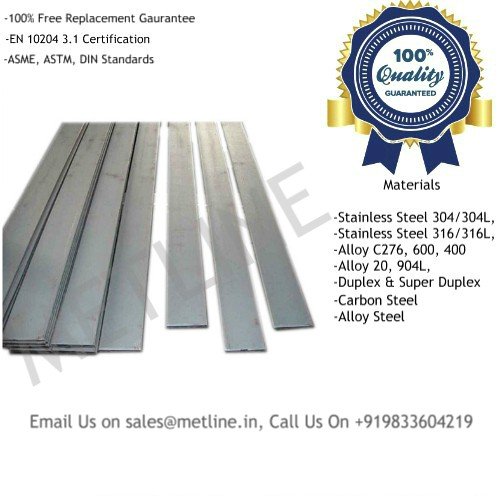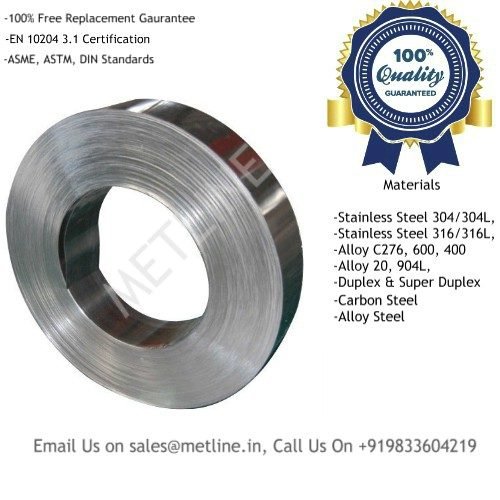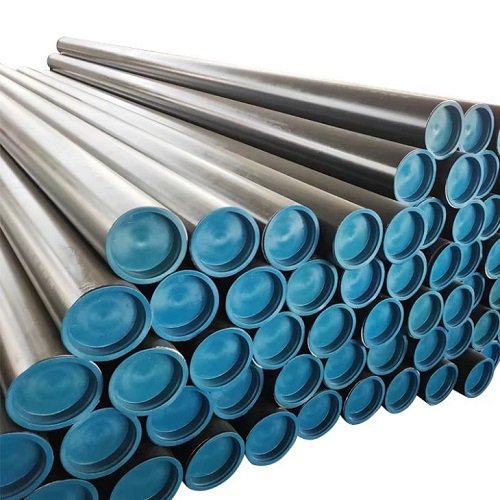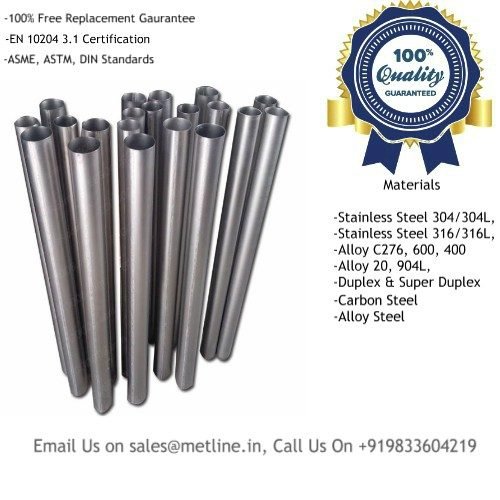Metline is a specialist supplier of Titanium flat bars and titanium flats worldwide. At Metline, Titanium flat bar products manufactured as per ASTM B348/ASME SB348 and ASTM B265 are available in Grades 1,2,3,4, 6AL4V and various other titanium grades. Two types of Titanium flats are available: pure Titanium flats and Titanium alloy flats such as Ti-6AI-4V.
Titanium flat bars are widely used in aircraft engines and parts, chemical equipment parts (reactors, pipes, heat exchangers and valves, etc.), ship hulls, bridges, medical implants, artificial bones, sporting products and consumer goods. Titanium is lightweight, strong, corrosion resistant and abundant in nature. Titanium and its alloys possess tensile strengths from 30,000 psi to 200,000 psi (210-1380 MPa), which are equivalent to those strengths found in most of alloy steels. The density of titanium is only 56% that of steel, and its corrosion resistance compares well with that of platinum. Of all the elements in the earth’s crust, titanium is the ninth most plentiful. Titanium has a high melting point of 3135°F (1725°C). This melting point is approximately 400°F (220°C) above the melting point of steel and approximately 2000°F (1100°C) above that of aluminium.
All our products are manufactured in accordance with ASTM, AMS and ISO standards including AMS 4928, AMS 4911, AMS 2631, AMS 4901, AMS 4907, AMS 4919, AMS 6931, AMS T 9046, AMS T 9047, ASTM B 337, ASTM B 338, ASTM B 381, ASTM F 67, ASTM F 136, ASTM B 348, ASTM B265 (plates cuttings).
| Gr5 Ti6AL4V Titanium Flat Welded Alloy Bars |
GR5 Titanium Alloy Flat Rods and Bars |
| Titanium Alloy Flat Bars |
Polished Titanium Flat Bars |
| Titanium Grade 2 Flat Bars |
Commercially Pure Titanium Flat Bars |
Titanium Flat Bars, Ti Flats Manufacturing, Production and Supply Range
| Products Name |
Titanium Flat Bars, Titanium Flats |
| Stock Material |
GR1, GR2, GR3, GR4, GR5, 6AL4V Eli, GR7, GR9, GR12, GR23 |
| Standards |
ASTM B348, ASTM F67, ASTM F136, ISO5832-2, ISO5832-3, ASTM B265 (Plate Cut Flats) |
| Titanium Bar Size |
- Ti Flat Bar, Strips Thickness: 1.0 – 100 mm
- Ti Steel Flat Bar Width: 10-1000 mm
- Custom Length
|
| Payment |
T/T, L/C, Other Payment Terms on Discussion |
| Certificate |
EN 10204 3.1, Chemical & Mechanical Test Reports |
| Surface |
Polished, Machined, Grind |
| Supply Condition |
Hot Rolling, Cold Drawing, Annealed, Plate Cuttings – Plasma, Water Jet Cutting, Laser Cutting |
| Delivery |
Ready Stock, 2 Weeks to 60 Days, Depending on Size and Order |
| Form |
Flat Rectangular Form |
| MOQ |
No MOQ. |
Comparison of Various Titanium Grades – Chemical & Mechanical Properties – General Properties
|
Fe max |
O max |
N max |
C max |
H max |
Pd |
Al |
V |
Mo |
Ni |
Elongation |
Rp 0.2 |
Rm |
| No |
wt% |
wt% |
wt% |
wt% |
wt% |
wt% |
wt% |
wt% |
wt% |
wt% |
% |
YS – MPa |
UTS – MPa |
| Grade 1 |
0.2 |
0.18 |
0.03 |
0.1 |
0.015 |
|
|
|
|
|
24 |
170—310 |
240 |
| Grade 2 |
0.3 |
0.25 |
0.03 |
0.1 |
0.015 |
|
|
|
|
|
20 |
275—450 |
345—480 |
| Grade 3 |
0.25 |
0.3 |
0.05 |
0.1 |
0.015 |
|
|
|
|
|
18 |
360—480 |
480—700 |
| Grade 4 |
0.5 |
0.4 |
0.05 |
0.1 |
0.015 |
|
|
|
|
|
15 |
500—530 |
600—680 |
| Grade 5 |
0.4 |
0.2 |
0.05 |
0.1 |
0.015 |
|
5.5-6.7 |
|
|
|
10 |
800—1100 |
890—1400 |
| Grade 6 |
|
|
|
0.1 |
|
|
|
|
|
|
16 |
780—820 |
820—860 |
| Grade 7 |
0.3 |
0.25 |
0.03 |
0.1 |
0.015 |
0,12-0,25 |
|
|
|
|
20 |
275—450** |
345 |
| Grade 9 |
0.25 |
0.15 |
0.02 |
0.05 |
0.015 |
|
2,5—3,05 |
|
|
|
15 |
550 |
650 |
| Grade 11 |
0.2 |
0.18 |
0.03 |
0.1 |
0.015 |
0.12—0.25 |
|
|
|
|
24 |
170-310** |
240 |
| Grade 12 |
0.3 |
0.25 |
0.03 |
0.1 |
0.015 |
|
|
|
0.3 |
0.8 |
25 |
414—460 |
499—600 |
| Grade 13 |
|
|
|
|
|
|
|
|
|
0.5 |
|
|
|
| Grade 14 |
|
|
|
|
|
|
|
|
|
0.5 |
|
|
|
| Grade 15 |
|
|
|
|
|
|
|
|
|
0.5 |
|
|
|
| Grade 16 |
|
|
|
|
|
0.04—0.08 |
|
|
|
|
27 |
345 |
485 |
| Grade 17 |
|
0.18 |
|
|
|
0.04—0.08 |
|
|
|
|
35 |
206 |
345 |
| Grade 18 |
|
|
|
|
|
0.04—0.08 |
3 |
2.5 |
4 |
|
|
|
|
| Grade 19 |
|
|
|
|
|
|
3 |
8 |
4 |
|
|
|
|
| Grade 20 |
|
|
|
|
|
0.04—0.08 |
3 |
8 |
4 |
|
|
|
|
| Grade 21 |
|
|
|
|
|
|
3 |
|
15 |
|
15—8 |
880—1250 |
915—1350 |
Various Titanium Grades & their UNS Designations
| Grades |
UNS |
Grades |
UNS |
| CP Grade 1 |
R50350 |
CP Grade 2 |
R50400 |
| CP Grade 3 |
R50550 |
CP Grade 4 |
R50700 |
| Titanium Grade 6 |
R54520 |
CP Grade 7 |
R52400 |
| Titanium Grade 9 |
R56320 |
CP Grade 11 |
R52252 |
| CP Grade 12 |
R53400 |
CP Grade 16 |
R52402 |
| CP Grade 17 |
R52252 |
CP Grade 26 |
R52404 |
| CP Grade 27 |
R52404 |
Titanium Grade 28 |
R56323 |
| Titanium Grade 29 |
R56404 |
Ti-10V-2Fe-3Al |
R56410 |
| Ti-13V-11Cr-3Al3-8-6-44 |
R58010 |
Ti-2.5Cu |
– |
| Ti-3Al-8V-6Cr-4Mo-4Zr |
– |
Ti-4Al-4Mo-2Sn |
– |
| Ti-5-2.5Sn ELI |
R54521 |
Ti-5.8Al-4.0Sn-3.5Zr-0.7Nb-0.5Mo-0.35Si-0.06C |
– |
| Ti-5Al-1Sn-1Zr-1V-0.8Mo |
– |
Ti-5Al-2Zr-2Sn-4Mo-4Cr |
R58650 |
| Ti-6Al-2Sn-2Zr-2Mo-2Cr-0.15Si |
R56222 |
Ti-6Al-2Sn-4Zr-2Mo |
R54620 |
| Ti-6Al-2Sn-4Zr-6Mo |
R56260 |
Ti-6Al-4V |
R56400 |
| Ti-6Al-4V ELI |
R56407 |
Ti-6Al-6V-2Sn |
R56620 |
| Ti-6Al-7Nb |
R56700 |
Ti-7Al-4Mo |
R56740 |
| Ti-8Al-1Mo-1V |
R54810 |
|
|
Various Titanium Alloys – Manufactured & Supplied Worldwide
Grade 1 :Unalloyed Titanium. Relatively low strength, high ductility and excellent weldability. Highly corrosion resistant in oxidizing and mildly reducing environments, including chlorides. Main use in heat exchangers.
Grade 2 :Unalloyed Titanium. Most widely used titanium in all product forms for industrial use, offering an excellent balance of moderate strength, ductility and weldability. Medium oxygen. Used in piping systems and heat exchanger tubing.
Grade 3 :Unalloyed Titanium. Offers optimum ductility and cold formability with useful strength, high-impact toughness, and excellent weldability. Highly corrosion resistant in oxidizing and mildly reducing environments, including chlorides. Main use in shell and tube heat exchangers.
Grade 4 :The highest strength pure unalloyed Titanium. High oxygen, extra high strength. Good corrosion resistance in neutral to oxidizing environments, including chlorides. Used in hydraulic and instrumentation tubing.
Grade 5 :Titanium alloy. 6% aluminium, 4% vanadium. Grade 5 is the most widely used titanium alloy. It has very high strength but relatively low ductility. The main application of this alloy is in aircraft and spacecraft. Offshore use is growing. The alloy is weldable and can be precipitation hardened.
Grade 6 :Titanium Alloy. Useful for applications requiring good weldability, stability and strength at elevated temperatures, such as airframe and jet engines.
Grade 7 :Unalloyed Titanium plus 0.12% to 0.25% palladium. Medium strength, standard oxygen. Most corrosion-resistant titanium alloy in reducing and oxidizing environments, with a good balance of moderate strength, reasonable ductility and excellent weldability. Physical and mechanical properties equivalent to Grade 2.
Grade 9 :Titanium alloy including 3% aluminium and 2.5% vanadium. Also known as “half 6-4”. 20-50% higher strength than C.P. grades, but has better weldability and higher tensile strength than the strongest unalloyed grade. Usual applications found in Aerospace, petrochemical, hydraulic & instrumentation tubing, sports and subsea applications.
Grade 11 :Unalloyed Titanium plus 0.12% to 0.25% palladium. This alloy is the same as Grade 1, but with palladium added for better corrosion resistance. Low oxygen. Low strength. Especially suitable for deep drawing requiring optimum ductiility and cold formability. Also has excellent weldability.
Grade 12 :Titanium alloy including 0.3% molybdenum, 0.8% nickel. High strength. Good heat, wear and corrosion resistance. Used for shell and heat exchangers, hydrometallurgical applications.
Grade 13 :Titanium alloy including 0.5% nickel and 0.05% ruthenium. Low oxygen.
Grade 14 : Titanium alloy including 0.5% nickel and 0.05% ruthenium. Standard oxygen.
Grade 15 : Titanium alloy including 0.5% nickel and 0.05% ruthenium. Medium oxygen.
Grade 16 :Unalloyed Titanium plus 0.04% to 0.08% palladium. Standard oxygen, medium strength. Has a good balance of moderate strength, reasonable ductility and excellent weldability. Used in chemical industries because of its outstanding corrosion resistance.
Grade 17 :Unalloyed Titanium plus 0.04% to 0.08% palladium. This alloy is the same as Grade 1, but with palladium added for better corrosion resistance. Grade 17 has optimum ductility and cold formability with useful strength, high-impact toughness, and excellent weldability. Very resistant to crevice corrosion.
Grade 18 :Titanium alloy including 3% aluminium, 2.5% vanadium plus 0.04% to 0.08% palladium.
Grade 19 :Titanium alloy including 3% aluminium, 8% vanadium, 6% chromium, 4% zirconium, 4% molybdenum.
Grade 20 :Titanium alloy including 3% aluminium, 8% vanadium, 6% chromium, 4% zirconium, 4% molybdenum plus 0.04% to 0.08% palladium. Beta – 21S is a metastable beta alloy that offers high specific strength and good formability, and has been designed for improved oxidation resistance, elevated temperature strength, creep resistance and thermal stability, especially in applications above 300°C.
Grade 21 :Titanium alloy including 15% molybdenum, 3% aluminium, 2.7% niobium, 0.25% silicon. Titanium alloy including 6% aluminium, 4% vanadium, and extra low interstitial, ELI23 Alloy 23 is an alpha-beta alloy based on Grade 5, providing improved stress corrosion cracking properties in seawater. Especially suited for thick wall highly stressed parts.
Grade 24 :Titanium alloy including 6% aluminium, 4% vanadium plus 0.04% to 0.08% palladium.
Grade 25 :Titanium alloy including 6% aluminium, 4% vanadium plus 0.3% to 0.8% nickel, 0.04% to 0.08% palladium.
Grade 26 :Unalloyed Titanium plus 0.08% to 0.14% ruthenium. Standard oxygen, medium strength. A corrosion-resistant titanium alloy offering outstanding resistance to general and localised crevice corrosion in a wide range of oxidizing and reducing acid environments including chlorides. Has a good balance of moderate strength, reasonable ductility and excellent weldability. Mechanical properties similar to Grade 2, but improved corrosion resistance. A competitive alternative to 7.
Grade 27 :Unalloyed Titanium plus 0.08% to 0.14% ruthenium. Low oxygen, low strength, and is the same as Grade 1, but with Ruthenium for better corrosion resistance, Grade 27 has optimum ductility and cold formability with useful strength, high-impact toughness, and excellent weldability. Very resistant to crevice corrosion.
Grade 28 :Titanium alloy including 3% aluminium, 2.5% vanadium, plus 0.08% to 0.14% ruthenium. High strength with enhanced corrosion alternative to 9.






Reviews
There are no reviews yet.